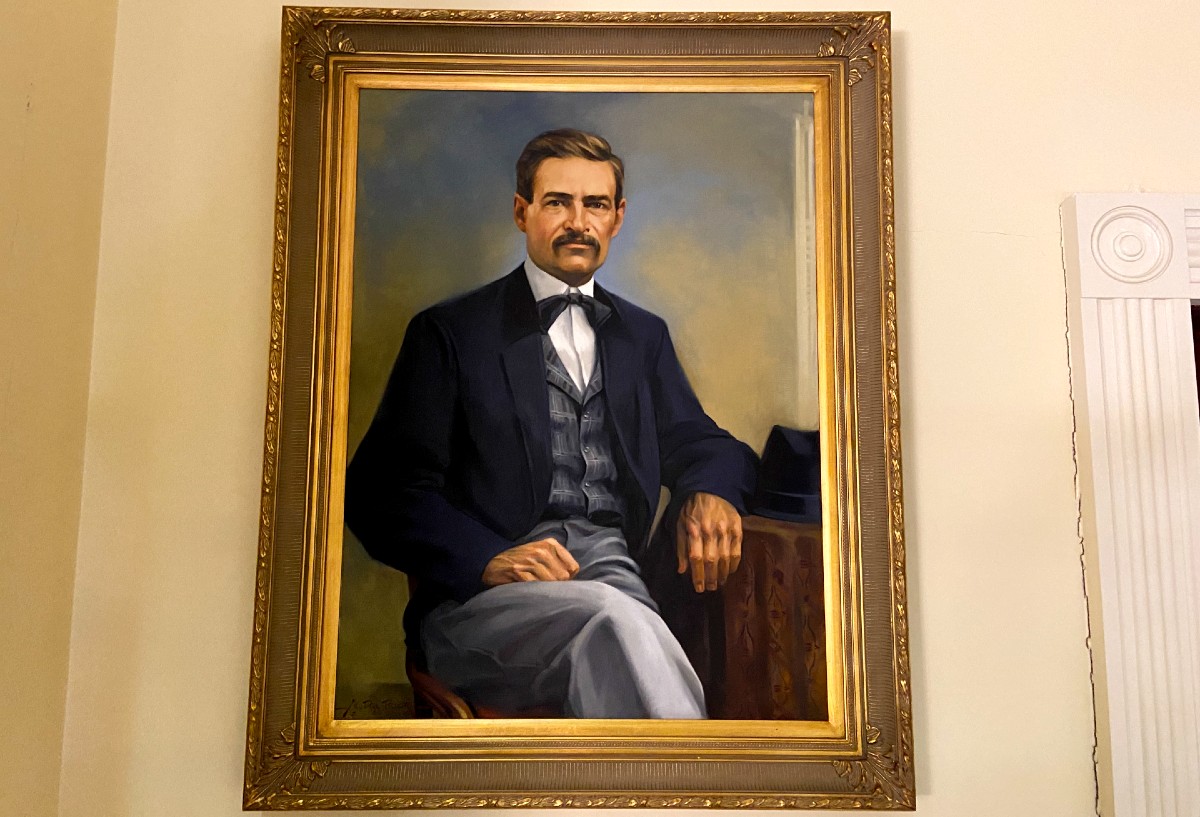By Herb Frazier | A portrait of a Black Reconstruction-era state senator and Civil War hero sat in a Statehouse closet for 13 years before finally being put on display Thursday in the Senate chamber without a public ceremony.

A new book by Charleston lawyer and historian Gordon Rhea is to be published next month by LSU Press.
From the blood-soaked sands of Morris Island during the Union Army’s assault on Fort Wagner near Charleston, Stephen Atkins Swails became the first black U.S. Army officer. Following the war, Swails gained prominence as a Williamsburg County businessman, newspaper editor and the first black man to serve as the Senate’s president pro tempore. He served in the state Senate from 1868 to 1878.
S.C. Sen. Gerald Malloy, D-Darlington, this week told the Charleston City Paper that the portrait was hung in a private ceremony after the newspaper questioned where it was. Malloy said he spoke to Senate President Harvey S. Peeler, R-Cherokee, who he said “is a friend, and he is conscious of these issues.” He declined to detail his conversation with Peeler.
Meanwhile Thursday, the specter of race raised its head when S.C. Sen. Sandy Senn, R-Charleston, took the opportunity to comment on Swails’ fair complexion. In an email with a “what’s up” emoji that she sent to Senate Clerk Jeffrey Gossett and all of the state’s senators, she wrote: “That sure is the whitest-looking black guy I’ve ever seen.”
On Friday, Senn told the City Paper that she didn’t mean the comment as a slight to Swails, but she thought she was sent a picture of the wrong portrait.
“I think this whole thing got blown way out of proportion,” she said. “I didn’t ever, ever intend for any kind of slight to this man. I think some good is going to come out of this. More attention is going to be brought to his significant and extraordinary history. Nothing I said is derogatory toward him. The good news is even if it is going to be at my expense, this gentleman will get some overdue recognition.”
- Read the full story in our sister publication, the Charleston City Paper.
In other recent news:
Wiles named distinguished alumnus. Charleston Stage founder Julian Wiles received one of eight Distinguished Alumni Awards from the University of North Carolina at Chapel Hill during an Oct. 12 ceremony. Wiles, a Fort Motte native, received a master’s degree in fine arts in dramatic art from the university in 1978. According to the award, “Julian Wiles has had an extensive and meaningful career in theatre as a playwright, director, designer and advocate. In 1978 he founded Charleston Stage, which has grown into one of the region’s largest and most respected arts institutions and includes an education program that reaches over 25,000 young people annually. Over the course of his career, Mr. Wiles has designed, directed and produced over 300 plays and musicals for Charleston Stage. He has written 34 original plays, musicals and stage adaptations, and more than 100 productions of his published works have been performed across the country and internationally.”
State is 4th most vulnerable to climate change. South Carolina is considered the fourth most vulnerable state to climate change’s effects, according to a recent report from the John Hopkins Bloomberg School of Public Health. The report also found that it is among the eight most unprepared states to deal with negative health effects associated with climate change. Read a story in sister publication Statehouse Report that highlights some legislators’ views on climate change. “Climate change supersedes partisanship,” she said.
Black history board members dismissed. Two veteran members of a state commission that promotes the preservation of Black history and culture said they were unexpectedly and unceremoniously “removed” from positions held since 1993, when state lawmakers created the S.C. African American Heritage Commission. A state official said there were more applicants this year than open seats. More: Charleston City Paper.
Police horse patrols could be coming back to Charleston. The sound of police horses clopping through downtown could return under a public-private partnership before members of Charleston City Council Tuesday. The ways and means committee will initially consider a proposed agreement between the Charleston Police Department (CPD) and the Charleston Area Convention and Visitors Bureau (CVB) to outfit and train two horses and officers for one year to establish the new mounted patrol unit. More.
Palmetto Brewing has new owners. For the second time in three years, Palmetto Brewing is under new ownership. Catawba Valley Brewing Co. (CVBC), which owns N.C.-based Catawba Brewing, Palmetto and its Twisp seltzer offshoot, was dealt to Made By The Water, LLC, which also owns Oyster City Brewing Co., based in Apalachicola, Florida. Made By The Water also includes Wiregrass Equity Partners, a private equity group. More.
Civil rights groups sue McMaster, state lawmakers over redistricting. Two civil rights groups are suing South Carolina, saying state lawmakers are taking too long to draw new district maps. More: Associated Press, WCSC TV, The State, The Post and Courier.
S.C.’s abortion restrictions to go to U.S. appellate court. The 4th U.S. Circuit Court of Appeals has tentatively scheduled oral arguments for Dec. 6 in a lawsuit challenging South Carolina’s new abortion law, which took effect this year and bans abortions after fetal cardiac activity is detected. Cardiac activity typically occurs six weeks into pregnancy. Since pregnancy is calculated from a person’s first day of her last period — not ovulation date — this means that many women may not know they are pregnant. More: AP News.
Biden wants wind farms along coasts, including S.C.’s. Under a plan announced by the Biden administration Wednesday, seven major offshore wind farms would be developed along the U.S. coasts, including in the Carolinas, an area between North Carolina and South Carolina called Carolina Long Bay. The lease sales will be held by 2025, under the plan, which seeks 30 gigawatts of power by 2030. That would power more than 10 million homes. More: AP News | The New York Times.
Retail imports drive banner September at port. South Carolina Ports had a record September for containers as Charleston’s port moved more than 200,000 twenty-foot equivalent containers. That was a 5 percent increase over the same month last year. For the year, the port handled 18 percent more containers than the same time last year, according to a news release.
- Want more headlines every business day that are like this? Visit our friends at SC Clips.





 We Can Do Better, South Carolina!
We Can Do Better, South Carolina!
























